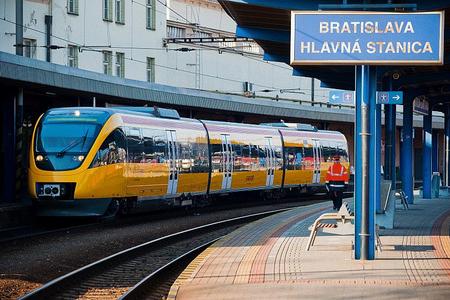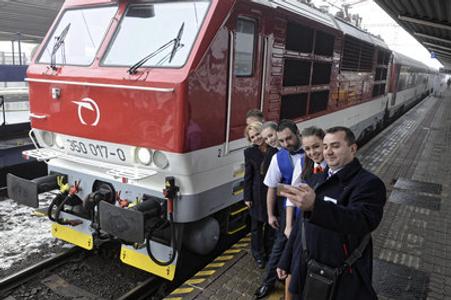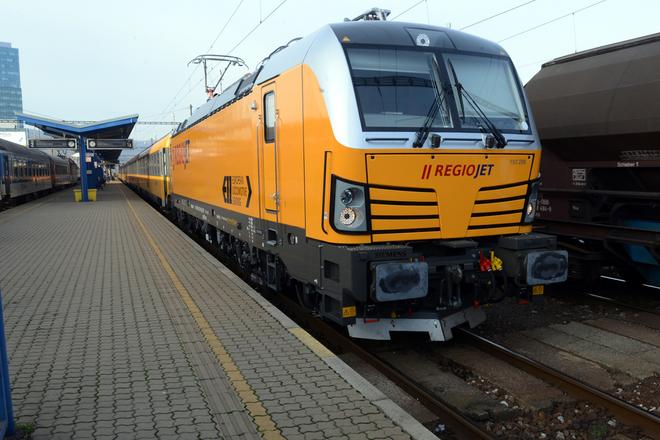Passengers travelling between Bratislava and Košice will not receive free coffee as of February 1 as the Czech private carrier, RegioJet will scrap its Intercity trains operating on this route.
The decision is now definite as the negotiations between RegioJet and the Transport Ministry about possibilities that could keep the company operating on the main Slovak route failed. Analysts point to the struggles the private carriers have on the route, especially due to the subsidies and social benefits offered by the state.
“We want to thank all the customers that have travelled with us on the Bratislava-Košice track, and also the fans for their grace and support,” RegioJet CEO Radim Jančura said in a press release sent to media on January 3.
He announced the intention to scrap the trains within the month – on January 31. The main reason was the re-introduction of IC trains operated by the state-run ZSSK company between Bratislava and Košice as well as free travel for students and pensioners offered by express trains on the same route.
The decision caused the company economic trouble and took more passengers from it, the carrier claimed.
The cancelled trains should be replaced by ZSSK which is also ready to operate the stations at which it currently does not stop.
“We’ll do our best to ensure that passengers do not feel this change and that there will be enough seats for everyone who wants to travel by train on Slovakia’s main rail route,” said Transport Minister Árpád Érsek (Most-Híd) on January 11, as quoted by the TASR newswire.
Fight for passengers
This is not the first time RegioJet has threatened to leave the route. It also complained about the negative impact of free travelling back in autumn 2015. It eventually stayed on the route, but mostly due to the promise of the one-party government of Robert Fico to withdraw the state IC trains.

The carrier subsequently increased the number of wagons, along with ticket prices. The return of state IC trains, however, has caused a decrease in passenger numbers, especially at the stations it shares with ZSSK – in Bratislava, Košice, Trnava, Poprad and Kysak, the Sme daily reported.
“ZSSK has been operating its IC trains with high losses for 20 years, though it had a monopoly on the market, the fares were higher and there was no free travel on express trains,” the company wrote in the press release.
The carrier doubts the state IC trains will appear in black numbers under current conditions as their capacity is not fully exhausted and they transport fewer passengers than RegioJet.
Ondrej Matej of the Institute for Transport and Economy says that if free transport was the main reason, the carrier would have already left the route two years ago.
“In our opinion, RegioJet uses the re-introduction of IC trains as an excuse to move its capacities to the more lucrative track between Bratislava and Prague, with a higher number of paying passengers,” Matej told The Slovak Spectator.

Political involvement in question
When talking about the restoration of IC trains between Bratislava and Košice, Jančura also criticised the political involvement of Speaker of Parliament and chair of the Slovak National Party (SNS) Andrej Danko. It was him who proposed the return of state IC trains to become part of the government’s manifesto.
Jančura also claimed that the SNS chair wants RegioJet to leave the Slovak market.
The party has rejected the criticism and said that the carrier blames Danko for its problems in the Slovak market rather than looking within its own ranks.
“We, however, have not banned RegioJet from doing business in Slovakia, nor have we asked it to leave the country,” Danko said in an official statement, adding that the carrier is leaving according to its own will.
SNS also defended the decision to return the state IC trains on the Bratislava-Košice route, saying it is “absolutely natural that every country wants and has to protect its companies”. The trains only created a healthy competitive environment, according to the official statement.
Also the ZSSK defends returning the trains to the route. Its head, Filip Hlubocký said in an interview with Sme that it was a professional and managerial decision to restore them, and rejected any political involvement.

Negotiations failed
Shortly after RegioJet announced its decision to leave, there was still a chance for it to keep its IC trains operating on the route as the Transport Ministry wanted to meet and discuss the conditions.
Prior to the meeting RegioJet proposed solutions to the current situation, suggesting changes to the system of free travelling in order to enable non-subsidised trains to offer free travelling as well. If the state paid about one half of the amount it gives on compensating free travel in subsidised express trains, the carrier would be willing to pay the rest.
The Transport Ministry, however, considered it an additional burden on its budget, so the minister decided to reject the private carrier’s proposal, TASR wrote.
Moreover, the ministry had already said it “will certainly not scrap this benefit for students and pensioners anytime soon”.
Marek Modranský, head of the Institute of Public Transport, meanwhile questioned RegioJet’s honesty, particularly due to its repeated threats to leave the Bratislava-Košice route, as reported by TASR.
Desana Mertinková, editor-in-chief of Železničná Revue magazine, however, reminds that the free travelling was introduced particularly to protect ZSSK from the so-called open access operators, i.e. carriers operating commercial trains.
Nearly all activities of the state carrier follow from an agreement with the ministry based on which it receives a subsidy of €7.7 per one train kilometre, while the open access operators do not receive any state compensation or discounts for certain groups of passengers, she told The Slovak Spectator.
Problematic liberalisation
There is also a question of whether Slovakia is a market enabling the operation of more carriers. Modranský claims that the country has only a limited railway infrastructure and thus it is necessary to squeeze the transport to the lowest number of carriers possible, as reported by the SITA newswire.
Also Matej states there are not enough passengers for the route to be profitable for more carriers. Thus, the line should be the subject of a competition whose winner would operate the transport there.
Mertinková explains that the open access operators struggle to find success on the market. The fact that ZSSK operates the IC trains on the route with losses planned for several years to come clearly shows the intention to get rid of the competition.
“I fear that the state is preparing other steps to push the competition of other routes as well,” Mertinková said.
Slovakia is not the only country facing problems with liberalisation of its national railway network. The European Parliament recently adopted the Fourth Railway Package which postpones the date of launching compulsory competitions on rail carriers from 2019 to 2023 and proposes several exceptions, Mertinková said.
“It is the result of lobbying of the biggest state railway companies in Europe, particularly in Germany, Austria, France and Italy,” she added.



 The yellow trains will disappear from the main railway track. (source: TASR)
The yellow trains will disappear from the main railway track. (source: TASR)